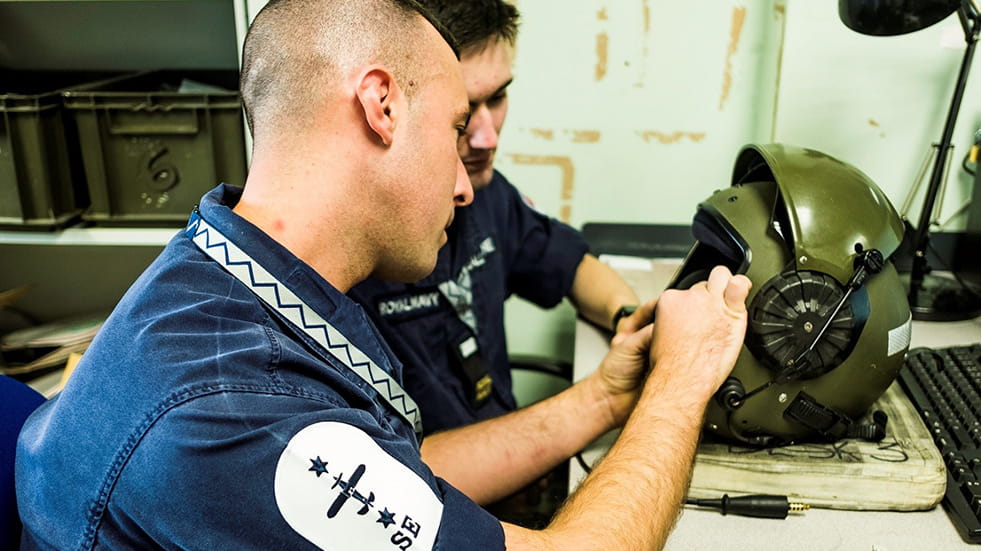Survival Equipment Technician (SET)
Lives will depend on the equipment you’re working with just as much as they’ll depend on your skills and attention to detail.
- £18,687 - £58,000
- No qualifications
- Fleet Air Arm
- Engineering
- Rating level
£25,200
Zero
£58,000
Free
6 weeks
Travel

Survival skills are vital in the Royal Navy for personnel and civilians alike, so being able to share and train others gives me a huge sense of pride.
Role details
What you’ll do
As a Survival Equipment Technician (SET), you will maintain vital lifesaving equipment to enable aircrew to operate safely. This equipment will help them to survive on Land, Sea or in the Air in peacetime or on military operations. You will also learn how to assist in the training of aircrew on land and sea in survival techniques.
Commitment, enthusiasm and focus are essential for a job of this importance. However, with it comes with the satisfaction of knowing you’re a crucial part of any mission, whether in peacetime or combat.
Your role
- As a Survival Equipment Technician, you’ll make sure your crewmates and passengers are fully equipped and know what to do in an emergency on board a Royal Navy aircraft.
- You’ll look after the crew’s protective gear, such as immersion suits, flying helmets, oxygen masks, parachutes and emergency breathing equipment.
- You will maintain the aircraft’s survival packs, radio beacons, distress flares, life jackets and life rafts. And most importantly, you’ll train people to use them in an emergency.
- You’ll also instruct on how to escape underwater from a ditched helicopter and other conduct survival drills.
- You will have the opportunity to serve on the world's most advanced aircraft carriers and with new and exciting aircraft Forces, including the F35B Lightning Stealth fighter at RAF Marham, the Merlin Mk2 Submarine Hunter at RNAS Culdrose, the Merlin Mk4 Helicopter and the Wildcat Maritime Attack Helicopter at RNAS Yeoviliton
Pay & benefits
- A starting salary of at least £18,687
- Earn up to £25,200 after Initial Training
- Earn up to £58,000 as your career progresses
- Six weeks of paid holiday every year
- Free medical and dental care
- Subsidised travel and accommodation
- Excellent pension scheme
- Earn additional Service Engineer Technical Pay as you progress to Leading Hand with increased pay levels on further promotion
Skills for life
Qualifications you'll gain
- Study for GCSEs, A-Levels, NVQs or even a degree
- Gain specialist vocational qualifications as your career progresses
- Attain a City and Guilds Level 3 Diploma in Aeronautical Engineering Survival Equipment Maintenance
- Streamlined route to registration as EngTech with a professional body
Skills you'll develop
- Complete a basic survival course and learn how to teach survival skills to your crewmates
- Learn how to maintain, repair and pack parachutes, life rafts and survival packs
- Enthusiasm for maintaining and repairing the most up to date Survival Technical Equipment
Eligibility
- You need to be aged between 16 to 39
- No qualifications are required for this role
- You must be a United Kingdom citizen or British Dual National. Dual Nationality restrictions do apply
- You must have lived in the UK for 5 years continuously prior to application
- Minimum height of 145cm
- A Body Mass Index (BMI) between 18 and 28 (between 17 and 27 if under 18)
- Pass the Naval Swimming Test
Skills & Interests
- A passion for working with state-of-the-art aircraft
- A keen attention to detail
- Good physical and mental stamina
- A willingness to learn new skills
- An adventurous spirit
Joining Process
From picking your role to starting on your first day, these are the steps you'll take to join as a rating.
Submit an application
Defence Aptitude Assessment (DAA)
You’ll be tested on: Verbal Reasoning, Numerical Reasoning, Work Rate, Spatial Reasoning, Electrical Comprehension and Mechanical Comprehension.
To prepare, you can practise the DAA
Interview
Candidate Preparation Course (CPC)
Start training
Career Progression
Your Royal Navy career begins with 10 weeks’ basic training at HMS Raleigh, a shore base in Torpoint, Cornwall
You’ll spend seven months at the Defence College of Aeronautical Engineering in Gosport. There you’ll learn survival drills and how to maintain, repair and pack parachutes, life rafts and survival packs, with regular tests to check your progress. You will also carry out a basic survival course and learn how to help with survival training,
You’ll then spend time at a Royal Naval Air Station, working closely with experienced aircrew to develop real-world knowledge and skills, before you qualify to sign off servicing work as complete.
Got a question?
Our virtual recruiter is available to answer your questions 24 hours a day
